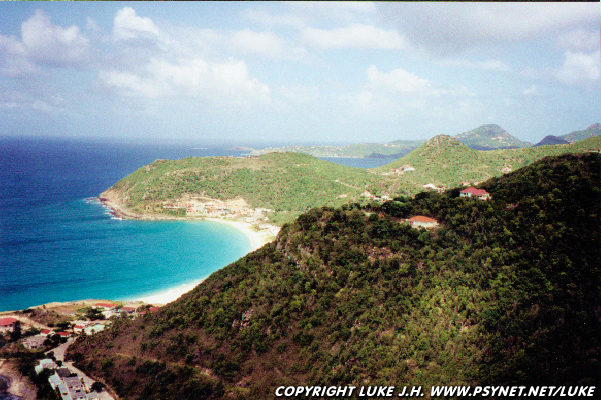
The mayor says goodbye. He has an appointment elsewhere. So I ask his brother, the deputy mayor, my questions about balancing tourism and the island's unique culture. Is it true, for instance, that moviemakers have been turned away? That he would like to discourage cruise ships from coming to St. Barts? "The people of the island, we like to live calm, to live in peace, to be" - he pauses to consider the words "to be like people on an island. To look at the sea, look at the sky, feel the wind. But those people who want to do anything for money don't care what we feel about this island.
Pointe a Colombier, St. Barth, F.W.I.
Image Copyright © LukeTravels.com™
"You cannot imagine how many problems I have with the beaches," he says, explaining the difficulties he faces. St. Barts has dozens of beaches, in a choice of sizes, textures, even colors, and they are the island's greatest attraction. "Everyone who comes to St. Barts wants to build something on the beach, to rent out Jet Skis, all those things," Magras says. "I am fighting with those guys. I say the beaches are public, and everyone has to be able to go there and not have some people coming to sell peanuts or rent Jet Skis. We want the beach free from everything like that." Moviemakers came to St. Barts with a proposal to make the action film Speed 2 there. But the municipal council voted overwhelmingly against the project. "When you get those big films, it is not good," Michel Magras explains. "They arrive with people already working for them, who build everything, who change the traffic and disrupt the island. It is not good for people who live here." 'Speed 2' ended up taking its business to St. Martin. As for the cruise ships, the islanders' concern is the number of people the huge boats pour onto this eight-square-mile island. As many as three ships sometimes came simultaneously, and one day in 1996 four arrived, sparking a protest demonstration. As one tourism official pointed out, "We have only 33 taxi drivers, and if we have 3,000 people who want to tour the island..." We have to have a balance between the tourism and the people who live here," Michael Magras says. When it comes to development, "we must always have a foot on the brake." One evening, I visited the terrace of an expensive hotel overlooking Gustavia. The setting sun turns 500 corrugated roofs a deeper shade of rose. The ching-ching of halyards against masts rises from a harbor filled with yachts, punctuated now and then by the splash of a large pelican or two diving into calm water. A room service waiter passes, carrying a bottle in a silver bucket. Probably not the Saint Emilion Cheval Blanc 1986 that the menu lists for 2,750 francs. It is, after all, low season. As the sun slips down, I glance over an adjacent hillside. A man comes from his rough house, threads his way through brush to tether his goat to a tree. Then he rests on his haunches, taking in a view that still belongs to him as much as to any actor, talk show host, or sipper of 2,750-franc wine. So far, it seems, the brakes are holding.
ST. BARTH TRAVEL FACTSFrom the States, the principal gateway is Sint Maarten where you can make connections via inter-island carriers to St. Barts. Many flights are available daily. Winair (Windward Islands Airways), offers a ten-minute flight from Juliana Airport on Sint Maarten, and Air St. Barthélémy also has flights from San Juan, Guadeloupe, and Espérance Airport on French St. Martin. Air Guadeloupe makes the flight from Espérance in ten minutes and from Guadeloupe in one hour. Air Guadeloupe also flies from St. Thomas a few times a week.
St. Barts' airport has a short landing strip that can handle planes no larger than a 20-seat aircraft. It is not equipped for night landing. Boutiques, bars, and car rental agencies can be found at the airport, and there's a pharmacy and food market across the road in La Savane Commercial Center.
There is a small departure tax in St Barths (€4.50), but it is usually included in the price of your ticket. Since 1st January 2008 a 5% government tax has been levied on all accommodation rates. There is no TVA (VAT) on goods and services in St Barths.
Two taxi stations are located at the airport and one in Gustavia on rue de la République. To call a taxi, dial 590-27-66-31; for night taxis, call Jean-Paul Janin (Tel. 590-27-61-86), Raymond Gréaux (Tel. 590-27-66-32), or Mathilde Laplace (Tel. 590-27-60-59).
Roads are hilly, steep, narrow, and winding, and drivers must know how to use a stick shift; your best options are Volkswagen Beetles, little open Gurgels and Minimokes. You'll save money if you rent by the week-daily rates go as high as US$60 a day, which includes unlimited mileage, collision damage insurance (first US$500 deductible), and free delivery.
Motorbikes, mopeds, and scooters are easy to rent, but you must wear a helmet (required by law). You must also have a motorbike or driver's license. Rentals can be found at Denis Dufau's Rent Some Fun (Tel. 590-27-70-59), which also carries 18-speed mountain bikes, or Fredéric Supligeau (Tel. 590-27-67-89).
Sleek catamarans leave the marina on Dutch St. Maarten between 9 and 9:30 AM daily, arriving in Gustavia harbor less than 90 minutes later. One-way trips are possible, but the usual fare is one-day round-trips.
You can also arrive on St. Barts by ferryboats from Saint-Martin, like the St. Barth Express III, which leaves at 7:30 AM and returns from Marina Porte La Royale in Marigot at 3:30 PM, and Bobby's Marina in Philipsburg at 4:15 PM, arriving in Gustavia 45 minutes later. To reserve, call 590-27-77-24 or fax 590-27-77-23. Two other ferryboats are the Dauphin II and the Bateau Dakar.





